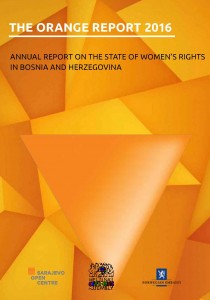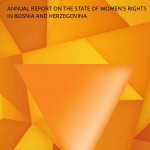The Orange Report 2016: CONFLICT RELATED SEXUAL VIOLENCE
 Changes to the Criminal Law BiH
Changes to the Criminal Law BiH
In May 2015 the Parliamentary Assembly BiH adopted the Changes and Amendments to the Criminal law of Bosnia and Herzegovina,[i] which finally harmonized the definition of rape and other forms of sexual violence committed as war crimes against the civilian population or crimes against humanity, with international standards and jurisprudence of the international criminal courts. “Forcing the other person by using force, or threat of direct attack on their life or body, or life or body of another” was taken out of the definition of the elements of the crime. The old definition implied that the use of force or the threat of use of force were the only means available to determine that rape or other sexual activities occurred without consent. On the other hand international jurisprudence developed an approach according to which coercive circumstance can indicate the lack of consent, and the circumstances can be inherent in certain situations, for an example – in armed conflict. Such circumstance imply lack of consent to the sexual activities when it is clear that the person was in a state of coercion which precluded the very possibility of exercising their sexual autonomy.
This is an example that needs to be followed not just in cases of conflict-related sexual violence, but also in instances of sexual violence during peacetime. In this way the number of perpetrators who can be prosecuted in the future is widened, because the obstacle of proof of this crime is removed. This change is also important in the context of deterrence from committing the crime in the first place, and so it has long-term potential and preventive functions.
Compensation awarded to victims of
conflict-related sexual violence within criminal proceedings
In June 2015 the Court of Bosnia and Herzegovina reached significant although appealable judgments in two cases (against Slavko Savić,[ii] and Bosiljak and Ostoja Marković[iii]) in which it was decided that in addition to jail time for the perpetrators, they were also obligated to pay the two victims of conflict-related sexual violence awards for the non-material damage they suffered. In one case the sum was 30,000 KM and in the other it was 26,500 KM, for the psychological harm suffered due to the restriction of liberty or rights of personality and harm suffered as a consequence of reduced life activity. This was the first decision of this kind reached in a war crimes trial. These judgments represent a key precedent for the wider region and not just for Bosnia and Herzegovina. Until these decisions not a single victim of conflict-related sexual violence, nor victims of war crimes in general had managed to get their right to compensation recognized within criminal cases, despite the rights they were given through the relevant provisions of the Criminal Law of Bosnia and Herzegovina on Realizing Property-Legal requests.
As a consequence of such system the majority of the survivors and especially the survivors of rapes and other forms of conflict-related sexual violence who are not receiving any support from the state, give up their basic rights to compensation, because the civil procedures require them to spend additional funds, testify again and live through the associated re-traumatization. It also reveals their identities, which are generally protected during the criminal trials. These are the basic reasons why these decisions are a significant victory for victims of war in BiH and how they can serve to strengthen the survivors’ trust in the judicial institutions and their ability to implement legislative provisions. In addition to this, such decisions have the potential to aid the survivors’ recovery and to strengthen their perception of their own position within criminal procedure – as active participants who can claim their basic rights to compensation and reimbursement, instead of mere witnesses who are used and re-victimized for the purpose of establishing the criminal responsibility of the accused.
Law on the Victims of Torture BiH
On 26 June 2015 the Joint Commission for Human Rights of the Parliamentary Assembly BiH held the first special sessions for International Day in Support of Torture Victims. It was concluded that the Council of Minsters BiH should prepare and put in the parliamentary procedure the Draft Law on the Rights of Victims of Torture by the end of 2015. A working group was formed in 2015, for this purpose, and the work on the draft proposal was started under the guidance of the Ministry for Human Rights and Refugees BiH. The draft was, however, not forwarded to the Council of Ministers BiH and neither was it submitted to the Parliamentary Assembly BiH. The Programme of Work of the Ministry of Human Rights and Refugees and the Programme of Work of the Council of Ministers BiH for 2016 both predict drafting a new text on the rights of victims of torture. A similar law has also been announced in Republika Srpska.
Judicial practice across Bosnia and Herzegovina was not uniform in the proceedings the victims of war crimes started in 2015 due to the absence of this law. The most troubling trend is the refusal of claims for compensation based on war crimes due to the temporal lapse in the statute of limitations. In addition to claims being thrown out, 2015 was also marked by multiple executive actions by Republika Srpska against the victims of war crimes with the aim of getting them to pay for the court expenses. This situation is particularly troubling because it is a source of re-victimization and re-traumatization for the victims of conflict-related sexual violence and torture, which is why the establishment of a collective administrative mechanism addressing the issue of damages systematically is of prime importance.
Change in the Law on claiming the status of victim of conflict-related sexual violence
Although a wide-ranging and systematic reform of the Social Services Sector in the Federation of BiH have been announced, the Government of FBiH started working on changing and amending the existing Law on the Basics of Social Protection, Protection of Civilian Victims of War and the Protection of Families with Children FBiH. The Draft Law envisages the formation of a special Commission by the Federal Ministry for Work and Social Policy, which would issue opinions on whether the claimant is a victim of sexual violence. This serves to introduce a new, unnecessary body, into the procedure, rather than using the existing mechanisms – e.g. the official Institute for Medical Assessment of Health in the Federation of BiH. In addition to this, the entire process of reform of the Social Services Sector has been conducted behind closed doors, without communicating the details to the civil society organizations and their representatives.
A Study on the position of Serb women victims of sexual violence
In 2015 the National Assembly of Republika Srpska discussed the findings and recommendations made in the study conducted by the Gender Center of Republika Srpska on the position of Serb women who were victims of the war crime of sexual violence in BiH. Many civil society organizations welcomed this study, since this question has been almost completely marginalized. On the other hand, the civil society organizations also pointed out that the findings of the study only related to the victims of a single ethnicity and not to all victims living in the territory of RS.[iv]
Guidelines for Action
- It is essential to carry on the good practice of deciding property-legal requests of victims of conflict-related sexual violence within the framework of criminal procedure by relying on the judges and the prosecutors to enforce the existing legislative provisions;
- The Council of Ministers BiH and the Parliamentary Assembly BiH have to draft and adopt the Law which will regulate the rights of torture victims in BiH;
- Republika Srpska has to exempt the victims of wartime torture from paying the court fees which have been imposed as a result of the refusal of their claims due to statutory limitations;
- It is necessary to leave out the new provision on the process of recognizing the status of victims of conflict-related sexual violence from the proposed draft of the law on Changes and Amendments of the Law on the Basics of Social Protection, Protection of Civilian Victims of War and the Protection of Families with Children FBiH, which were put into the Parliamentary procedure in 2015.
You can find the Orange Report 2016 – Annual Report on the State of Women’s Rights in BiH following this link.
—
[i] Službeni glasnik BiH, br. 40/15.
[ii] Slavko Savić, Sud BiH S1 1 K 017213 14 KrI, 29.06.2015. Apelaciono vijeća Suda BiH je potvrdilo ovu odluku 2016, available at: http://diskriminacija.ba/vijesti/potvr%C4%91ena-presuda-za-ratno-silovanje-u-predmetu-savi%C4%87
[iii] Marković Bosiljko i dr., Sud BiH S1 1 K 012024 14 Kri, 24.06.2015
[iv] http://womenorganizingforchange.org/izjave/otvoreno-pismo-narodnoj-skupstini-republike-srpske-povodom-rasprave-ns-rs-o-informaciji-o-nalazima-i-preporukama-studije-o-polozaju-srpskih-zena-zrtava-ratnog-zlocina-seksualnog-nasilja-u-bih/
Narandžasti izvještaj 2016Orange report 2016women's rights The Orange Report 2016 – Annual Report on the State of Women’s Rights in Bosnia and Herzegovina
The Orange Report 2016 – Annual Report on the State of Women’s Rights in Bosnia and Herzegovina